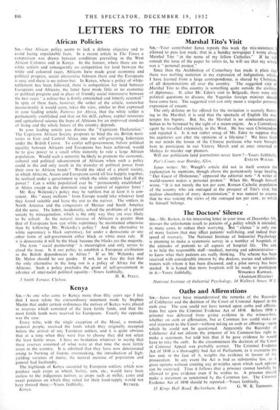LETTERS TO THE EDITOR
African Policies
SIR,—Our African policy seems to lack a definite objective and to avoid facing unpalatable facts. In a recent article in The Times a comparison was drawn between conditions prevailing in the West African Colonies and in Kenya. In the former, where there are no white settlers and consequently no competition for land between the white and coloured races, Africans have made great economic and political progress, social intercourse between them and the Europeans is easy and there is no colour-bar. In Kenya, where a policy of white- settlement has been followed, there is competition for land between Europeans and Africans, the latter have made little or no economic or political progress and in place of friendly social intercourse between the two races " a colour-bar is firmly entrenched and bitterly resented." In spite of these facts, however, the writer of the article, somewhat inconsistently it would seem, takes the view, similar to that expressed in your leading article, Patterns for Africa, that the white settler is permanently established and that on his skill, culture, capital resources and agricultural science the hope of Africans for an improved standard of living and the whole future of the country depends.
In your leading article you discuss the " Capricorn Declaration." The Capricorn African Society proposes to bind the six British •terri- tories in East and Central Africa into one self-governing federation under the British Crown. To confer self-government, before political equality between Africans and Europeans has been achieved, would be to give power to a small white minority to rule a large African population. Would such a minority be- likely to promote the economic, cultural and political advancement of Africans when such a policy could in the end only result in the .transfer of political power from their own to African hands ? Would the ideal of a plural society, in which Africans, Asians and Europeans could all live happily together, be realised under a government in which the white settlers had all the power ? Can a white population' ever be " permanently established" in Africa except as the dominant race in control of superior force ?
Mr. Roy Welensky's policy may be ruthless but at least it is con- sistent. His " many millions " from Europe would take whatever land they found suitable and leave the rest to the natives. The settlers in North America and the conquerors of Mexico and South America did the same. The latter, incidentally, solved the problems of a plural society by miscegenation, which is the only way they are ever likely to be solved. As the natural increase of Africans is greater than that of Europeans how can white supremacy be maintained otherwise than by following Mr. Welensky's policy ? And the alternative to white supremacy is black supremacy, for under a democratic or any ,other form of self-government either black or white must rule. -If it is democratic it will be the black because the blacks are the majority.
The term " racial partnership " is meaningless and only serves to cloud the issue. Is it our policy to establish a European civilisation in the British dependencies in Africa ? If so Mr. Welensky and Dr. Malan should be our guides. If not, let us face the fact that the only alternative in the long run is a policy of Africa for the Africans. Such a policy precludes the grant of self-government in advance of inter-racial political equality.—Yours faithfully,
5 Smith Terrace, Chelsea.
H. -R. PELLY.


































 Previous page
Previous page